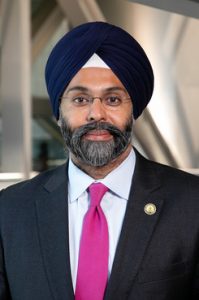State AGs' Price-Fixing Action Claims Pharma Companies Had 'Fair Share' Understanding
Several pharmaceutical companies with New Jersey roots are among the 20 named in an antitrust lawsuit alleging a conspiracy to fix prices for more than 100 generic medications.
May 13, 2019 at 05:00 PM
5 minute read
The original version of this story was published on Connecticut Law Tribune

Several pharmaceutical companies with New Jersey roots are among the 20 named in an antitrust lawsuit alleging a conspiracy to fix prices for more than 100 generic medications.
Connecticut Attorney General William Tong is leading a 44-state coalition in the lawsuit—filed May 10 in the U.S. District Court for the District of Connecticut against the 20 companies and 15 individuals. New Jersey is part of the coalition.
The suit alleges Teva Pharmaceuticals USA Inc., Pfizer Inc., Sandoz Inc., Mylan Pharmaceuticals Inc. and other companies have conspired since at least 2012 to fix the prices on well-known drugs like Niacin ER tablets, Warfarin sodium tablets and Omega-3 acid ethyl esters. The drugs span all types, including tablets, capsules, suspensions, creams, gels, ointments and classes, including statins and antidepressants.
The 524-page lawsuit, which also names 15 individuals, includes emails, telephone calls and texts allegedly showing competitors working together to fix prices on the drugs.
“For many years, the generic pharmaceutical industry has operated pursuant to an understanding among generic manufacturers not to compete with each other and to instead settle for what these competitors refer to as 'fair share,'” according to the lawsuit. “By 2012, Teva and other co-conspirators decided to take this understanding to the next level. Apparently unsatisfied with the status quo of 'fair share' and the mere avoidance of price erosion, Teva and its co-conspirators embarked on one of the most egregious and damaging price-fixing conspiracies in the history of the United States.”
The lawsuit continues: “Teva had understandings with its highest quality competitors to lead and follow each other's price increases, and did so with great frequency and success, resulting in many billions of dollars of harm to the national economy over a period of several years.”
'They Started Asking Questions'
Teva, Pfizer, Sandoz and Mylan are the four largest makers of generic drugs listed as defendants.
In a statement, Teva wrote: “The allegations in this new complaint, and in the litigation more generally, are just that—allegations. Teva continues to review the issue internally and has not engaged in any conduct that would lead to civil or criminal liability. Teva delivers high-quality medicines to patients around the world, and is committed to complying with all applicable laws and regulations in doing so. We will continue to vigorously defend the company.”
Sandoz, a division of Novartis with its U.S. headquarters in Princeton, also denied wrongdoing.
In a statement, it wrote: “We acknowledge that Sandoz has been named in an industry-wide litigation involving virtually the entire generic pharmaceutical industry. We believe that these claims are without merit and will vigorously contest them. Sandoz takes its obligations under the antitrust laws seriously. We will continue to be committed to providing high-quality, affordable medicines to United States patients, and conducting business with customers and the government with integrity.”
Pfizer, too, denied the allegations against its subsidiary, Greenstone. It wrote: “The company has cooperated with the Connecticut attorney general since it was contacted over a year ago. We do not believe the company or our colleagues participated in unlawful conduct and deny any wrongdoing. Greenstone has been a reliable and trusted supplier of affordable generic medicines for decades and intends to vigorously defend against these claims.”
Mylan Pharmaceuticals did not respond to requests for comment Monday.
 Connecticut Attorney General William Tong
Connecticut Attorney General William TongMeanwhile, the Connecticut attorney general, Tong, said two attorneys in his office, Mike Cole and Joe Nielsen, began the investigation six years ago. That investigation began after the attorneys read a story in the New York Times in 2013 about the price of the drug digoxin. Their findings led to the filing by Connecticut and the coalition of dozens of other states.
“They started asking questions and investigating back then,” Tong said. ”This is a Connecticut-led case. … It began in our office and is being led by our office.”
Tong called the alleged price-fixing “overt, blatant and undertaken utterly without shame.”
“They just did it like it's a regular part of their day, which is why we have been able to identify so much of the evidence through email, text messages and phone records,” he said. “They openly and continuously colluded with one another on price and market share.”
New Jersey Attorney General Gurbir Grewal suggested his office saw a similar pattern.
 Gurbir Grewal – Photo by Carmen Natale/ALM
Gurbir Grewal – Photo by Carmen Natale/ALM“We all know that prescription drugs can be expensive. Now we know that high drug prices have been driven in part by an illegal conspiracy among generic drug companies to inflate their prices,” Grewal said in a statement.
“It is particularly troubling that so much of this unlawful conduct took place in New Jersey,” Grewal added. “I've said before and I'll say again that New Jersey's pharmaceutical industry is the envy of the world. But no New Jersey company will get a free pass when it violates the law and harms our residents, just because it is located here.”
The AGs say they hope the lawsuit will help curb drug prices.
“It answers one of the basic questions we all have: … Why are our drug prices so damn expensive?” Tong said. “This is the reason. It's about price-fixing, collusion and market share.”
As far as the remedy, Tong said: “We want the misconduct to stop and we want the companies to pay back the billions of dollars they stole from the American people, including those in Connecticut.”
This content has been archived. It is available through our partners, LexisNexis® and Bloomberg Law.
To view this content, please continue to their sites.
Not a Lexis Subscriber?
Subscribe Now
Not a Bloomberg Law Subscriber?
Subscribe Now
NOT FOR REPRINT
© 2025 ALM Global, LLC, All Rights Reserved. Request academic re-use from www.copyright.com. All other uses, submit a request to [email protected]. For more information visit Asset & Logo Licensing.
You Might Like
View All

Social Media Policy for Judges Provides Guidance in a Changing World
3 minute read
Bank of America's Cash Sweep Program Attracts New Legal Fire in Class Action
3 minute readTrending Stories
- 1States Accuse Trump of Thwarting Court's Funding Restoration Order
- 2Microsoft Becomes Latest Tech Company to Face Claims of Stealing Marketing Commissions From Influencers
- 3Coral Gables Attorney Busted for Stalking Lawyer
- 4Trump's DOJ Delays Releasing Jan. 6 FBI Agents List Under Consent Order
- 5Securities Report Says That 2024 Settlements Passed a Total of $5.2B
Who Got The Work
J. Brugh Lower of Gibbons has entered an appearance for industrial equipment supplier Devco Corporation in a pending trademark infringement lawsuit. The suit, accusing the defendant of selling knock-off Graco products, was filed Dec. 18 in New Jersey District Court by Rivkin Radler on behalf of Graco Inc. and Graco Minnesota. The case, assigned to U.S. District Judge Zahid N. Quraishi, is 3:24-cv-11294, Graco Inc. et al v. Devco Corporation.
Who Got The Work
Rebecca Maller-Stein and Kent A. Yalowitz of Arnold & Porter Kaye Scholer have entered their appearances for Hanaco Venture Capital and its executives, Lior Prosor and David Frankel, in a pending securities lawsuit. The action, filed on Dec. 24 in New York Southern District Court by Zell, Aron & Co. on behalf of Goldeneye Advisors, accuses the defendants of negligently and fraudulently managing the plaintiff's $1 million investment. The case, assigned to U.S. District Judge Vernon S. Broderick, is 1:24-cv-09918, Goldeneye Advisors, LLC v. Hanaco Venture Capital, Ltd. et al.
Who Got The Work
Attorneys from A&O Shearman has stepped in as defense counsel for Toronto-Dominion Bank and other defendants in a pending securities class action. The suit, filed Dec. 11 in New York Southern District Court by Bleichmar Fonti & Auld, accuses the defendants of concealing the bank's 'pervasive' deficiencies in regards to its compliance with the Bank Secrecy Act and the quality of its anti-money laundering controls. The case, assigned to U.S. District Judge Arun Subramanian, is 1:24-cv-09445, Gonzalez v. The Toronto-Dominion Bank et al.
Who Got The Work
Crown Castle International, a Pennsylvania company providing shared communications infrastructure, has turned to Luke D. Wolf of Gordon Rees Scully Mansukhani to fend off a pending breach-of-contract lawsuit. The court action, filed Nov. 25 in Michigan Eastern District Court by Hooper Hathaway PC on behalf of The Town Residences LLC, accuses Crown Castle of failing to transfer approximately $30,000 in utility payments from T-Mobile in breach of a roof-top lease and assignment agreement. The case, assigned to U.S. District Judge Susan K. Declercq, is 2:24-cv-13131, The Town Residences LLC v. T-Mobile US, Inc. et al.
Who Got The Work
Wilfred P. Coronato and Daniel M. Schwartz of McCarter & English have stepped in as defense counsel to Electrolux Home Products Inc. in a pending product liability lawsuit. The court action, filed Nov. 26 in New York Eastern District Court by Poulos Lopiccolo PC and Nagel Rice LLP on behalf of David Stern, alleges that the defendant's refrigerators’ drawers and shelving repeatedly break and fall apart within months after purchase. The case, assigned to U.S. District Judge Joan M. Azrack, is 2:24-cv-08204, Stern v. Electrolux Home Products, Inc.
Featured Firms
Law Offices of Gary Martin Hays & Associates, P.C.
(470) 294-1674
Law Offices of Mark E. Salomone
(857) 444-6468
Smith & Hassler
(713) 739-1250







